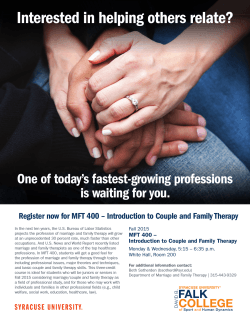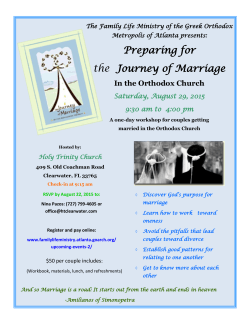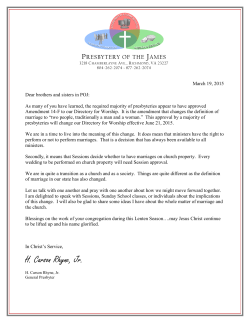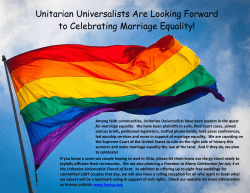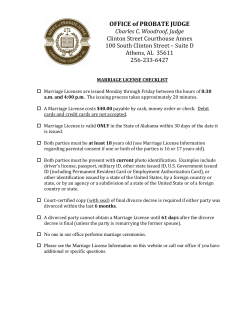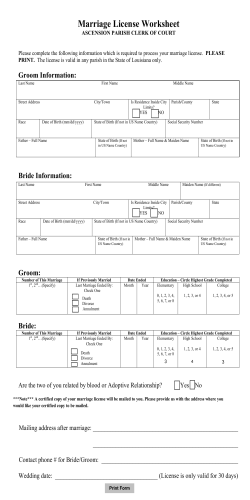
Marriage shall be entered into only with the free and full consent of
Marriage shall be entered into only with the free and full consent of the intending spouses from the UN’s Declaration of Human Rights This brochure is available at www.tvangsekteskap.no and on the publishers’ websites. Information to parents about marriage What should parents decide? Whether teenagers can have boy/girlfriends? Whether or not they should marry? When they should marry? Who they should marry? The Sabil family Maryam’s parents hear there are rumours circulating about their daughter. They are worried that it will be difficult to get her “properly married”. They want to help their daughter make the right decisions for the future. The Sabils have a 19-year-old daughter called Maryam. She is about to finish her Upper Secondary education. Her parents are proud that she has done so well at school. Maryam sometimes spends time with her friends after school, but members of the family say they have heard she is out with boys. Her parents are deeply offended. Are rumours circulating about Maryam? Do people think they are not good parents? That they are not raising their daughter properly? They have asked Maryam to spend more time at home. Want to give advice Maryam’s parents want her to get an education before she gets married, but now they are worried. If she waits before getting married there could be more rumours, and this will make it difficult to find a “suitable spouse”. And what if she falls in love? Her parents believe that young people are often steered by “unreliable” feelings, and that it is adults who know best. Other members of the family are frequently asking when Maryam is going to be wed. When her mother was her age, she had already been married for several years. Her parents do not want to pressure her, but to give her advice. It is difficult to talk to her about future plans and marriage, so instead the mother tells her stories about families where there have been conflicts and problems caused by choices made by the children. Does Maryam understand what problems she might cause by waiting to get married? The mother hopes Maryam understands what is best for her. But what do they do if she refuses to listen? 3 Maryam (19) Maryam Sabil realises that her parents do not trust her, and is worried that they want to “marry her off”. Maryam enjoys school and sometimes stay behind with friends to do schoolwork and chat. She wants her parents to trust her and tells her mother everything about what she and her friends do together. She is disappointed when her parents say they want her to spend more time at home: “Don’t you trust me? Would you rather believe what others say than listen to me, your own daughter?” Afterwards, she gets a bad conscience for having snapped at them. What plans do the parents have? Maryam wants to study and wait before getting married, but now she is worried. Her parents say there are rumours about her. Her mother tells her about other families that have problems with their children. What does she mean by this? Maryam sometimes finds it difficult to sleep, and can break into tears when she is alone in her room. She finds it difficult to concentrate at school and recently performed badly in a test. Maryam thinks: “It’s my life!” Then she considers everything her parents have done for her and feels ashamed. Maryam has never doubted that her parents only want what is best for her, but can she trust them to take her own wishes into consideration? What will happen if her parents refuse to listen to her? • When you were young, what sort of relationship did you have with your parents? • What was it like when you got married? Did you decide when to get married and with whom? • If you were Maryam, how would you regard the situation? • What advice would you give Maryam? What advice would you give her parents? 5 Marriage in Norway People entering into marriage in Norway shall do so of their own free will. This is laid down in the human rights convention and Norwegian law. Mental pressure and coercion can give young people serious health problems. In many societies, arranged marriages are a tradition, where parents take it upon themselves to ensure their children are “properly wed”. Arranged marriages are permitted under Norwegian law provided they are entered into voluntarily and it is the wish of both intended spouses. Forced marriage Involvement of the family in choosing a spouse can be regarded as difficult for children who have grown up in Norway, where it is normal for children and young people to be encouraged to make their own decisions. Some will find spouses on their own; some might prefer to obtain their parents’ consent and support, while others may even ask for help from their parents to find a spouse. When involvement by the family is perceived as pressure or coercion, it is called forced marriage. Rights and laws The United Nation’s Universal Declaration of Human Rights states that marriage shall be entered into only with the free and full consent of the intending spouses. This means that those entering marriage must do so in full agreement. Norwegian law states that people shall enter into marriage of their own free will, while women and men have the same right to freely choose a spouse. The age of consent for marriage in Norway is 18 years. Same-sex marriage is also permitted. It is prohibited in Norway to pressure or force a person into marriage, and is punishable by a term of imprisonment. This also applies if a person is forced into marriage abroad and one of the parties is domiciled in Norway. A marriage entered into under pressure or coercion can be annulled. When such a marriage is annulled, the parties to the marriage will be registered as single and not divorced. Right to self-determination That a person shall enter into marriage of his or her own free will means it is up to the individual to decide whether he or she wants to get married, with whom he or she wants to get married, and when he or she wants to get married. No religion accepts forced marriage. Marriages entered into abroad are NOT recognised in Norway if: • One of the parties is under the age of 18 at the time the marriage is contracted • The marriage is entered into without both parties being present • One of the parties is already married These rules apply if at least one of the parties is domiciled in Norway when the marriage is contracted. 7 Mental pressure Forced marriage does not only involve physical coercion or violence, but often involves mental pressure and a young person’s loyalty to his or her parents. Mental pressure includes “nagging” by the parents; and preying on a young person’s conscience by talking about problems in other families caused by children not listening. Mental pressure can also involve parents not allowing their children to choose their own friends, clothes, spare time activities and education. Mental pressure and coercion can result in a child developing health problems such as headaches, loss of sleep and difficulty concentrating at school. Some suffer depression or develop eating disorders. Conflicts can also affect the health of parents. Talking together Many parents find it difficult to talk directly to their children about their future and marriage. How can you maintain your authority as a parent and talk openly on subjects where you and your child perhaps have different opinions? Your child may find it difficult to raise such issues because of his or her respect and loyalty to you as a parent. Parents carry a huge responsibility for showing it is possible to freely discuss issues together. • A person shall enter into marriage of his or her own free will • Mental pressure can result in young people developing serious health problems • Parents are responsible for showing it is possible to discuss difficult issues together • When you were young, what did you want to talk about with your parents? • What do you think young people perceive as difficult in terms of their relationships with parents? • Do you know what plans and wishes your children have for their future, education and marriage? How can you take the initiative to discuss these issues with them? 9 Where can you find help? Parental guidance Many municipal authorities provide parental guidance services. This is where you can meet other parents and share thoughts and experiences. Parents can talk about the joys and challenges of raising children. Among issues raised are: How can you have a better relationship with teenage children? How can you support and help a teenage child develop in a positive direction? How do other parents resolve challenging issues? You can find more information about this at www.bufetat.no/foreldreveiledning. You can also call your local municipal authority. Local offices for children, youth and family affairs Parents who are concerned about their child can visit their local office for children youth and family affairs either alone or with their children. The office works with focus on the entire family, and parents and teenage children can receive advice on how to talk about difficult issues together. You can find more information about your local office at www.bufetat.no. You can also call your local municipal authority. The Child Welfare Service Parents can get advice and guidance about children from the Child Welfare Service, which is responsible for ensuring that children are properly cared for and grow up in safe and secure surroundings (see www.barnevernet.no). All municipal authorities have a child welfare service you can contact. You will find more information about this on your local municipal authority’s website or by ringing your local municipal authority direct. The Child Welfare Emergency Service The Child Welfare Emergency Service is open when other offices are closed. You can contact them if you have problems and need help quickly. Ring 116 111 and you will be transferred to your local Child Welfare Emergency Service. If there is no emergency service or the office is closed, you will be connected to the emergency call line for children and youth (Alarmtelefon for barn og unge). For more information and an overview of where in Norway you can find the Child Welfare Emergency Service go to: www.barnevernvakt.no Staff at asylum centres If you are staying at an asylum centre, you can approach the staff if you need help or someone to talk to. They can give you advice and help you get in touch with the right support agency for help. The Norwegian Red Cross helpline for forced marriage and genital mutilation The Norwegian Red Cross helpline is an information service where young people and parents can obtain professional advice, as well as assistance in getting in touch with the right support agency for help. The helpline is open every day from 09.00 to 17.00. Tel.: 815 55 201. For more information: www.tvangsekteskap.no 11
© Copyright 2026



